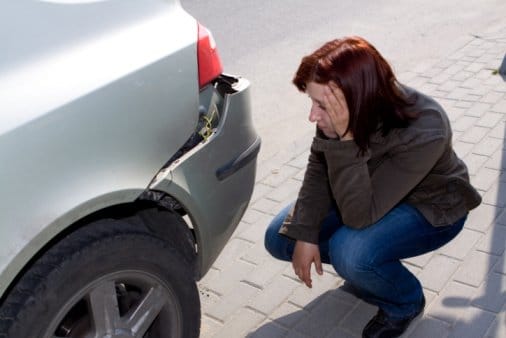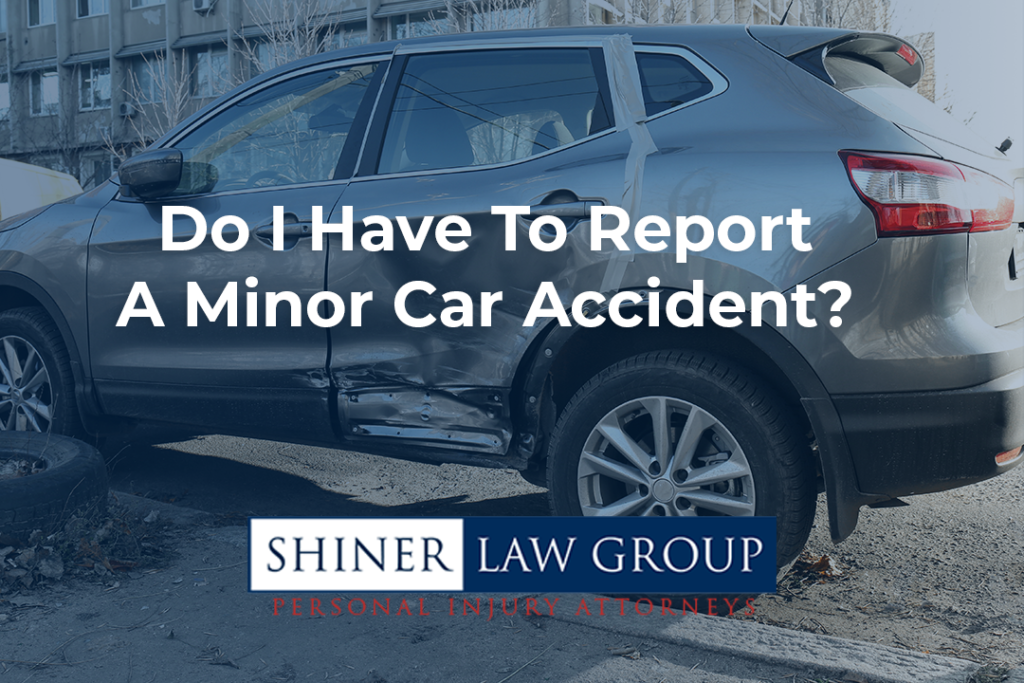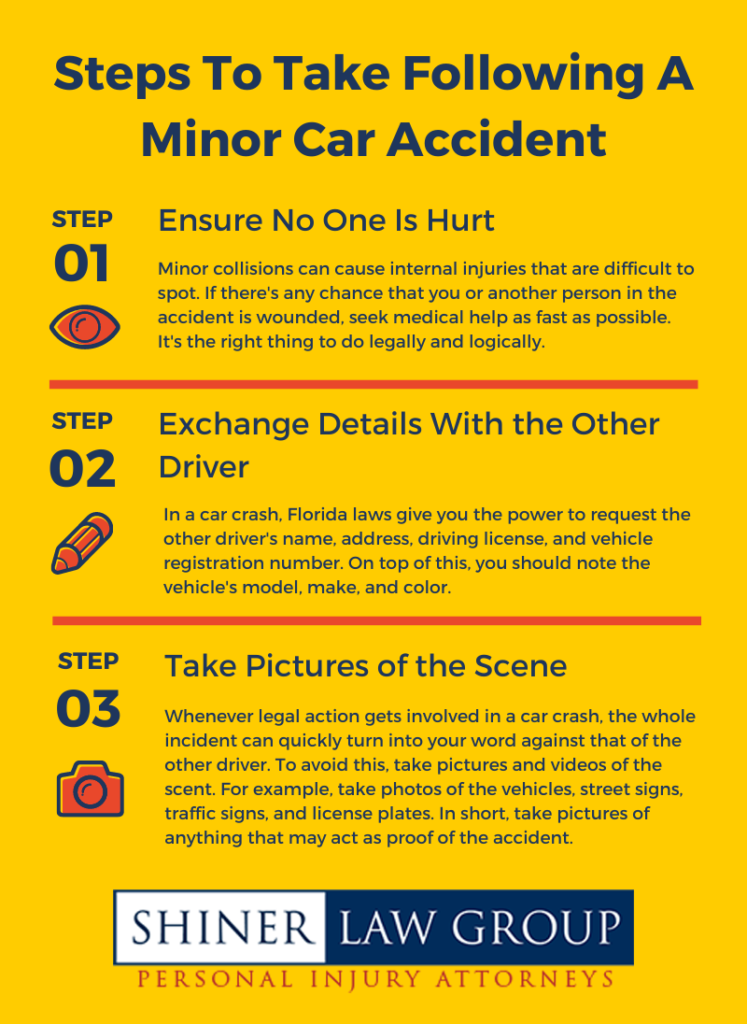What Is a Minor Car Accident?

Minor car accidents involve slight damage to the vehicle such that it can still operate even after the crash. The injuries involved in a minor accident don’t cause disability or threaten your life. Most minor collisions include:
- Cracked windshield
- A small dent in the vehicle’s side
- Busted taillight or headlight
While minor collisions don’t involve serious injuries, you shouldn’t take them lightly. After all, even a low-speed rear-end accident can easily worsen pre-existing medical conditions. The accident can also cause injuries that manifest later on.
For this reason, you need to consider all perspectives when deciding whether or not to report minor accidents to the authorities or insurance company. The factors below help you determine when it’s right to report a minor car accident to your insurer.
What Factors Influence Whether or Not to Report a Minor Car Accident to the Insurance Company?
Here are the factors to consider when deciding whether or not to report a minor car accident to your insurer or the police.
1. Are Injuries Involved in the Minor Crash?
You need to inform your insurance company if injuries are involved in the accident, even if the wounds are minor. The reason is that commotion after car collisions can hide the severity of a wound, making it seem less harmful than it is. Additionally, injuries like soft tissue damage take a few days to manifest completely.
Reporting the minor crash ensures the insurance company covers the costs tied to the accident’s injuries. As a result, you avoid heavy medical bills associated with underestimating the severity of a wound.
2. How Serious are the Vehicle Damages?
If the accident doesn’t involve any injuries and the vehicle damage is negligible, you and the other driver can settle the issue between yourselves. For example, you may agree not to report the car accident to the insurance companies, and instead, the at-fault driver pays for the slight damage out of pocket. If you’re both at fault, you may agree to leave the negligible damage as-is.
However, you need to report the accident to your insurer if you’re not at fault, but the other driver refuses to pay for the damages. When doing so, have the following information at hand:
- The extent of damage to your vehicle
- The other driver’s license number or insurance company name
- The vehicle make, model, and license plate of the other driver
Your insurer will help you recover the damages from the at-fault driver. That way, you get your car back to the proper form without digging into your bank account.
3. Where Did the Accident Occur?
Some minor car accidents occur in private properties like parking lots. Most minor car accidents on private property involve shared fault between the drivers. In this case, you may not benefit if you report the accident to your insurer. The shared fault negatively affects your insurance premium (more on this in the next subtopic).
Some minor car accidents involve a single vehicle on private property. For example, you may reverse your vehicle into the garage door, damaging the taillights and the rear bumper. In this scenario, you should report the accident to your insurer if you have comprehensive coverage. Informing the insurance company ensures you get the money to fix the vehicle damages without digging deep into your pocket.
4. How Will Reporting the Minor Accident Affect Your Insurance Premiums?
No one wants to increase their insurance premiums, which explains why many people hesitate to inform the insurer of minor car accidents. Your vehicle insurance company analyzes your annual claims to calculate your insurance premiums for the following year. The more claims you make, the higher the premiums you’ll pay, especially if you’re at fault in most claims.
However, the fear of increasing your insurance premium shouldn’t be a reason not to file a claim. After all, law enforcement authorities are more likely to give you a traffic ticket if you’re at fault in an accident. The ticket appears on your driving record that the insurer uses to renew your coverage and calculate your insurance premiums.
If your insurance company finds out that you were at fault in an accident and didn’t report, your premiums can skyrocket significantly. In worse circumstances, your insurer may decline to offer you insurance services.
Generally, don’t fear to report minor accidents to your insurer if you are not at fault. In such a case, your insurance premiums shouldn’t increase because the other driver’s insurer will cover for the injuries (if any) and damages in a minor accident.

Must You Report a Minor Accident to the Law Enforcement Authorities?
According to Florida’s laws, a driver in a car accident that involves injuries or vehicle damage must report to the nearest law enforcement authority if no police officer is present. This law applies to the driver of any vehicle in the accident. It doesn’t matter whether you are or not at fault.
You must provide the police officers with specific information upon request. For instance, you need to give them your name, address, vehicle registration number, and driving license. The law demands that the other driver give you these details if you ask them to. You, too, must submit these details to the driver involved in the accident upon request.
What Happens If You Don’t Report the Accident?
As long as the accident involves injuries and vehicle damages, you need to inform the police. Otherwise, you can face charges with harsh penalties. The 2018 Florida Statutes 316.061 declares that it’s an offense not to report a car crash that results in injuries and vehicle damages.
If you violate this law, you will have committed a second-degree minor crime. You’ll pay a fine of up to $500 if the law finds you guilty. A second-degree misdemeanor also has a penalty of up to sixty days in prison.
Sixty days is a long period to stay behind bars. For this reason, it’s always best to report a car crash, even if you risk getting a traffic ticket.
Are There Circumstances Where You Don’t Have to Report a Minor Accident?
There are specific scenarios where not reporting a minor accident doesn’t make you break the law. For example, if you’re in an accident involving you and your property, you can choose not to include the authorities. In other words, you don’t need to make a police statement if no other person or property is involved in the accident other than you.
You may also decline to involve the insurer if the damages are negligible. On the other hand, you can file a compensation claim to get insurance help if the damages are significant.
Can You Sue or Get Sued for a Minor Car Accident?
You cannot sue the at-fault driver for a car accident with negligible damages. The No-Fault law in Florida dictates that insurance covers minor injury and property damages associated with a vehicle accident, no matter whose fault it is. The injury threshold must meet the definition in Florida Statute 316.027 to sue or get sued.

What Steps Should You Follow After a Minor Car Accident?
Following specific steps after an accident ensures you don’t violate the law and get the compensation you deserve.
Ensure No One Is Hurt
Minor collisions can cause internal injuries that are difficult to spot. If there’s any chance that you or another person in the accident is wounded, seek medical help as fast as possible. It’s the right thing to do legally and logically.
Exchange Details With the Other Driver
In a car crash, Florida laws give you the power to request the other driver’s name, address, driving license, and vehicle registration number. On top of this, you should note the vehicle’s model, make, and color.
This information will protect you when making a claim. It also reduces the investigation complexities to fasten the compensation procedure.
Take Pictures of the Scene
Whenever legal action gets involved in a car crash, the whole incident can quickly turn into your word against that of the other driver. To avoid this, take pictures and videos of the scent. For example, take photos of the vehicles, street signs, traffic signs, and license plates. In short, take pictures of anything that may act as proof of the accident.
Who To Contact After A Minor Car Accident?
Driving is such a common activity for most of us that we really don’t spend much time thinking about the potential dangers; what happens if I am involved in a car accident? Thankfully, most crashes are relatively inconsequential and do not involve injury to a driver or passenger. However, that begs the question; if the accident is minor, do I really need to involve the police or my insurance company? Can’t I just handle it on my own? Should I contact my auto accident lawyers in Boca Raton?
Contact the Police
Typically, there is no legal requirement to file a police report unless there is some physical injury to one or more of the parties involved in the accident, or there is property damage above a certain dollar threshold, which may be different depending on the particular state where the accident occurred. A few issues, however, to keep in mind:
- Some injuries are latent and do not appear immediately, and what may seem to be a non-injury accident is not.
- Assessing the cost to repair the damage from even a minor crash can be difficult; the total adds up quickly.
- All states have laws regarding leaving the scene of an accident. At the very least you must exchange information with the other driver, but make certain the circumstances do not require more.
Contact the DMV
Most states have similar requirements for reporting an accident to the DMV as for filing a police report; that is, bodily injury or death and a property damage threshold. If a police report was filed, the police will inform the DMV.
Contact your Insurance Company
The contractual language of almost every auto insurance policy requires you, as the driver, to report any and all accidents to your insurer. No matter what, you should contact your accident attorneys first for guidance. As a practical matter, however, there is not much chance your insurance company will find out if you don’t. Even if the police responded to the scene and filed a report, law enforcement does not inform insurance carriers as part of its regular protocol. However, if you were cited for a traffic infraction at the scene, your insurance company will likely learn of this, which may trigger an investigation and uncover the accident. Always call your injury lawyers at Shiner Law Group at 561-777-7700 for help in these situations.
Contact your Accident Attorneys at Shiner Law Group is crucial to any car crash
Even if the circumstances are such that you will not suffer any negative consequences from the police, DMV or your insurance company, you probably want to have your car repaired. If the other driver was clearly at fault and offers to pay for your damages out of his or her own pocket, you should be wary. If the other party doesn’t pay, you have a problem. No one wants to see his or her insurance premium go up, but trying to avoid that consequence can expose you to greater harm.
In short, whether you have to report a minor car accident is dependent on the facts and circumstances of your situation. There are potentially negative consequences that must be weighed under a risk-reward analysis. The best way to protect yourself if you have been involved in a minor car accident is to speak with our experienced car accident attorneys at 561-777-7700, who can help you determine if it’s necessary and how best to file a claim with your insurer carrier.
How Does a Lawyer Help You in a Minor Car Accident?
Hiring a lawyer after a minor car accident is extremely useful because of the following reasons:
An Attorney Provides Helpful Legal Guidance
In some minor accidents, you must follow specific regulations to avoid violating the law. For example, you need to make a statement if the collision involved damages or injuries. A qualified lawyer on your side ensures your statements don’t make you at fault.
A Lawyer Can Help You Contest a Traffic Ticket You Don’t Deserve
A traffic ticket increases traffic law violations to your driving record. An attorney analyzes the incident to dig out any possible evidence proving you aren’t at fault. As a result, you don’t get a traffic ticket you don’t deserve.
A Reliable Lawyer Ensures You Get Maximum Compensation from the Insurance Company
Your insurance company focuses on compensating you with the least amount possible during an accident. No one will play with your rights with a car accident attorney on your side. You will get the exact compensation you deserve.
Let an Experienced Lawyer Help You Deal With a Minor Car Accident
At Shiner Law Group, your best interests are at the core of our operation. We personalize our services to give your situation the attention it needs. We will walk you through all the legal options when handling a minor car accident. Call us today on 561-777-7700 or contact us to schedule a free consultation. We are here to fight for your rights.